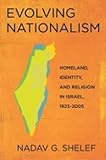Evolving Nationalism : Homeland, Identity, and Religion in Israel, 1925–2005 / Nadav G. Shelef.
Material type: TextPublisher: Ithaca, NY : Cornell University Press, [2018]Copyright date: ©2010Description: 1 online resource (296 p.) : 12 halftones, 3 tables, 9 maps, 7 line drawingsContent type:
TextPublisher: Ithaca, NY : Cornell University Press, [2018]Copyright date: ©2010Description: 1 online resource (296 p.) : 12 halftones, 3 tables, 9 maps, 7 line drawingsContent type: - 9781501729874
- 320.5409569409/04 23
- DS113.3 .S57 2010eb
- online - DeGruyter
| Item type | Current library | Call number | URL | Status | Notes | Barcode | |
|---|---|---|---|---|---|---|---|
 eBook
eBook
|
Biblioteca "Angelicum" Pont. Univ. S.Tommaso d'Aquino Nuvola online | online - DeGruyter (Browse shelf(Opens below)) | Online access | Not for loan (Accesso limitato) | Accesso per gli utenti autorizzati / Access for authorized users | (dgr)9781501729874 |
Browsing Biblioteca "Angelicum" Pont. Univ. S.Tommaso d'Aquino shelves, Shelving location: Nuvola online Close shelf browser (Hides shelf browser)

|

|

|

|

|

|

|
||
| online - DeGruyter Law in the Liberal Arts / | online - DeGruyter Working from the Margins : Voices of Mothers in Poverty / | online - DeGruyter Industry, State, and Society in Stalin's Russia, 1926–1934 / | online - DeGruyter Evolving Nationalism : Homeland, Identity, and Religion in Israel, 1925–2005 / | online - DeGruyter From Hire to Liar : The Role of Deception in the Workplace / | online - DeGruyter Mixed Signals : U.S. Human Rights Policy and Latin America / | online - DeGruyter Schools of Democracy : A Political History of the American Labor Movement / |
Frontmatter -- Contents -- Preface -- Nationalism, Change, and Evolution -- Part I. Where Is the Land of Israel? -- 1. Labor Zionist Mapping of the Homeland -- 2. Religious Zionist Mapping of the Homeland -- 3. Revisionist Zionist Mapping of the Homeland -- Part II. Destiny and Identity -- 4. Transformations of the Collective Mission -- 5. Arabs and Diaspora Jews in Israeli National Identity -- 6. Ongoing Transformations of Israeli Nationalism -- Nationalism and the Question of Change -- Notes -- Bibliography -- Index
restricted access online access with authorization star
http://purl.org/coar/access_right/c_16ec
Evolving Nationalism examines how the idea of Israel as a nation-state has developed within Zionist and Israeli discourse over the past eight decades. Nadav G. Shelef focuses on the changing ways in which the main nationalist movements answered three distinct questions in their private and public ideological articulations between 1925 and 2005: Where is the "Land of Israel"? Who ought to be Israeli? What should the Zionist national mission be?Framed within broader debates about how and why changes in foundational definitions of the nation occur, Shelef's analysis centers on the mechanisms of ideological change and then subjects them to empirical scrutiny. He thus moves beyond the common but problematic assumptions that such transformations must be either a rare, rational adaptation to traumatic shock or a relatively constant product of manipulation by power-hungry elites. He finds that nationalist movements, including radical and religious fundamentalist ones, can and do change cardinal components of their ideological beliefs in both moderating and radicalizing directions.These changes have more to do with the unguided consequences of engagement in day-to-day politics than with strategic reaction to new realities, the use of force, or the changing incentives of leaders. Engaging with some of the most contentious debates about the nature of Israeli nationalism and the geographic, religious, and ethnic definition of the state of Israel, Shelef has made signal contributions to our understanding of Middle East politics and of the ideological underpinnings of nationalism itself.
Mode of access: Internet via World Wide Web.
In English.
Description based on online resource; title from PDF title page (publisher's Web site, viewed 26. Apr 2024)


